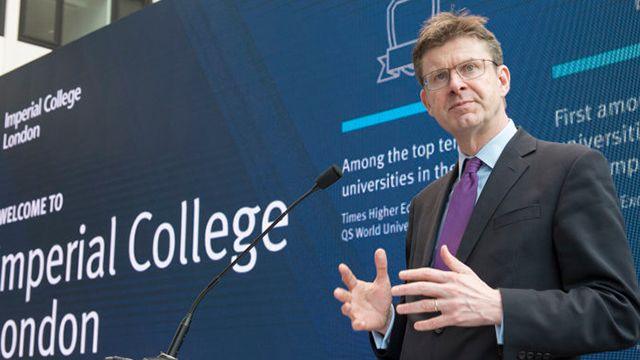Coronavirus: Government is 'distilling best science'
- Published

Mr Clark believes the use of expertise, like that of Imperial, has been laudable
The Commons Science Select Committee has praised the government’s use of science in its handling of the coronavirus epidemic.
The backing comes after some scientists raised concerns that the government was “risking lives” by not introducing more drastic measures earlier in the outbreak.
The MPs have launched an investigation, external.
It will look at how science has been used to inform the measures introduced to control the spread of the virus.
Greg Clark, the committee chair, told BBC News that the government’s measures had been based on the “best distillation of (scientific) advice that has been possible”.
"The role of science through the chief medical officer and the government's chief scientific adviser has been very prominent. And what we have seen so far is that the advice has been acted upon,” he added.
Mr Clark’s comments are in contrast to the chair of the Commons Health Select committee, Jeremy Hunt, who raised concerns last week that the government was moving too slowly in stopping the spread of coronavirus.
Mr Clark’s comments follow a private briefing given to the Science Select Committee by key experts, including Prof Neil Fergusson, from Imperial College London, whose study published on Monday led to the dramatic ramping up of control measures.
MPs also heard evidence focussing on how UK scientists and social scientists have informed actions on the domestic and global scale, as well as on potential barriers for the expert community as the outbreak continues.
In addition, the select committee received a briefing on efforts to diagnose the disease rapidly, and measures such as vaccines and potential therapies taken to tackle infection.
Mr Clark said his committee would continue to take evidence through the spring and summer to monitor the government’s handling of the crisis.
“We want to make sure that during and after the crisis we learn all of the lessons, for everything from the role of UK science in understanding the causes and the reasons for the outbreak of this pandemic to how science contributed to the handling of it," he told BBC News.
"If we were to discover, for example, that the government was departing from taking a rigorously scientific view, that would be something that would be of concern. And then obviously we'd need to call that out."

EASY STEPS: What should I do?
A SIMPLE GUIDE: What are the symptoms?
SYMPTOMS: Should I self-isolate?
MAPS AND CHARTS: Visual guide to the outbreak
VIDEO: The 20-second hand wash
